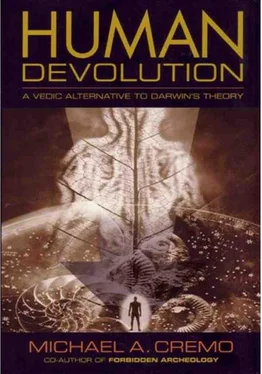Michael Cremo - Human Devolution - A Vedic Alternative To Darwin's Theory
Здесь есть возможность читать онлайн «Michael Cremo - Human Devolution - A Vedic Alternative To Darwin's Theory» весь текст электронной книги совершенно бесплатно (целиком полную версию без сокращений). В некоторых случаях можно слушать аудио, скачать через торрент в формате fb2 и присутствует краткое содержание. Год выпуска: 2003, ISBN: 2003, Издательство: Torchlight Publishing, Жанр: Старинная литература, на английском языке. Описание произведения, (предисловие) а так же отзывы посетителей доступны на портале библиотеки ЛибКат.
- Название:Human Devolution: A Vedic Alternative To Darwin's Theory
- Автор:
- Издательство:Torchlight Publishing
- Жанр:
- Год:2003
- ISBN:9780892133345
- Рейтинг книги:4 / 5. Голосов: 1
-
Избранное:Добавить в избранное
- Отзывы:
-
Ваша оценка:
- 80
- 1
- 2
- 3
- 4
- 5
Human Devolution: A Vedic Alternative To Darwin's Theory: краткое содержание, описание и аннотация
Предлагаем к чтению аннотацию, описание, краткое содержание или предисловие (зависит от того, что написал сам автор книги «Human Devolution: A Vedic Alternative To Darwin's Theory»). Если вы не нашли необходимую информацию о книге — напишите в комментариях, мы постараемся отыскать её.
Human Devolution: A Vedic Alternative To Darwin's Theory — читать онлайн бесплатно полную книгу (весь текст) целиком
Ниже представлен текст книги, разбитый по страницам. Система сохранения места последней прочитанной страницы, позволяет с удобством читать онлайн бесплатно книгу «Human Devolution: A Vedic Alternative To Darwin's Theory», без необходимости каждый раз заново искать на чём Вы остановились. Поставьте закладку, и сможете в любой момент перейти на страницу, на которой закончили чтение.
Интервал:
Закладка:
Chapter 11 outlines the concept of human devolution, bringing together the various lines of evidence presented in the previous chapters. We do not evolve up from matter; rather we devolve, or come down, from the level of pure consciousness. Originally, we are pure units of consciousness existing in harmonious connection with the supreme conscious being. When we give up our willing connection with that supreme conscious being, we descend to regions of the cosmos dominated by the subtle and gross material energies, mind and matter. Forgetful of our original position, we attempt to dominate and enjoy the subtle and gross material energies. For this purpose, we are provided with bodies made of the subtle and gross material energies. These bodies are vehicles for conscious selves. They are designed for existence within the realms of the subtle and gross material energies. Conscious selves who are less forgetful of their original natures receive bodies composed primarily of the subtle material energy. Those who are more forgetful receive bodies composed of both the subtle and gross material energies, with the gross material energies predominating. The original conscious being in the Vedic universe is Brahma, the first demigod. His body, manifested directly from Vishnu, is made primarily of the subtle material elements. He is tasked with manifesting bodies for the other conscious selves existing at various levels of the cosmic hierarchy. From the body of Brahma come great sages, sometimes known as his mental sons, and also the first sexually reproducing pair, Svayambhuva Manu and his consort Shatarupa. The daughters of Manu become the wives of some of the sages, and they produce generations of demigods and demigoddesses, with bodies composed primarily of the subtle material energy. These demigods and demigoddesses, by their reproductive processes, produce the forms of living things, including humans, who reside on our earth planet. In their reproductive processes, they make use of bijas , or mental seeds, which contain essential elements of the plans for the various bodies. The existence of DNA alone is not sufficient to explain how the forms of living things are manifested. For the most part, the genes on the DNA strand just code for the production of various proteins. How these proteins are combined in the complex forms of organisms is not specified by the DNA. The concept of a mental seed containing the developmental plan for bodies, including the human body, thus complements the existence of DNA. The human devolution concept thus has something in common with Darwinism. Like Darwinism, the human devolution concept posits a first living thing from which other living things develop by a process of reproduction with modification. But the process is intelligently guided.
I now wish to acknowledge my indebtedness to some of those who made this book possible. During the years 1984 to 1995, I worked closely with Richard L. Thompson, and Human Devolution owes much to the countless discussions we had during those years. Anyone desiring to understand a Vedic perspective on modern science should consult Thompson’s foundational works mechanistic and nonmechanistic Science, alien Identities, and mysteries of the Sacred universe . Since 1993 I have been fortunate to have Lori Erbs as my research assistant. With her masters degree in library science and experience as director of a science research library for an agency of the United States government, she has carried out the most complicated and demanding research requests in a prompt, thorough, professional manner. She was also responsible for preparing the Human Devolution manuscript for submission to my publisher. Lori was greatly assisted by Fay Fenske, the interlibrary loan specialist for the Bellingham Public Library, in Bellingham, Washington. Fay obtained many rare books and journal articles from around the world. Alister Taylor, of Torchlight Publishing, has been an understanding partner in publishing my works since 1993. I remain grateful to the international trustees of the Bhaktivedanta Book Trust for their continuing support of my research and publishing. I am especially grateful to the North American trustee Emil Beca for the various ways in which he has supported my work. For their expert help in the typesetting, proofreading, and design of this book, I thank Yamaraja Dasa, Chris Glenn, Varsana Staszak, and Mollie Thonneson. Thanks also to Gary Aleksiewicz for the index. Finally, I am grateful to Irina Martynenko and Yuri Dementyev for locating a peaceful place for me to stay in Yalta so that I could finish this introduction after a lecture tour of the Ukraine.
Michael A. Cremo
Yalta
December 14, 2002
NOTE ON ORTHOGRAPHY: In Human Devolution I spell Sanskrit words phonetically for ease of pronunciation by readers not familiar with the scholarly system of diacritics.
Ascended Apes or Fallen Angels?
“By next Friday evening they will all be convinced that they are monkeys,” wrote Thomas Henry Huxley to his wife Henrietta (WgTdt 1972, p. 71). The year was 1860, and on June 30, Huxley would confront Samuel Wilberforce, Bishop of Oxford, in one of history’s most famous debates. The topic was Charles Darwin’s theory of evolution.
Samuel Wilberforce despised Darwin’s theory, published the previous year in The Origin of Species, and he was determined to demonstrate its shortcomings. Although a bishop of the Church of England, Wilberforce knew something of science. He was a lifelong student of natural history, and he served as a vice president of the British Association for the Advancement of Science. He had also been on the governing council of the Geological Society of London, and he knew well several leading scientists of his day, such as geologist Charles Lyell, one of Darwin’s chief supporters, and biologist Richard Owen, one of Darwin’s chief opponents.
At the invitation of the editor of the influential Quarterly Review, Wilberforce had written a negative critique of The Origin of Species . It was not printed until after the Huxley-Wilberforce debate , but when it finally did appear, Darwin himself called it “uncommonly clever” (F. Darwin 1887, p. 324).
In his review, Wilberforce (1860) first attacked Darwin on scientific grounds. In The Origin of Species, Darwin had argued that living things tend to vary slightly in the course of reproduction. After giving examples from bird and animal breeding, Darwin contended that over vast periods of time, aided by natural selection, such variation could lead to the origin of new species. But Wilberforce noted that the variations obtained in breeding pigeons, dogs, and horses were not changes in the basic physical structure of these creatures, such as required for the production of new kinds of organisms. Pigeons remained pigeons, dogs remained dogs, and horses remained horses. Turning to metaphysics, Wilberforce argued that such human qualities as free will and reason were “equally and utterly irreconciliable with the degrading notion of the brute origin of him who was created in the image of God.”
Huxley’s Triumph
On June 30, at the British Association for the Advancement of Science meeting in Oxford, Dr. J. W. Draper of New York read a paper titled “Intellectual Development of Europe Considered with Reference to the Views of Mr. Darwin.” Expecting fireworks, seven hundred attentive hearers had packed the lecture hall. After Draper finished his talk, several persons offered comments. Finally, Wilberforce spoke, attacking Darwin’s theory. His confident words mirrored those that would later appear in his Quarterly Review article on The Origin of Species. Attempting to draw a laugh, he wondered “if any one were willing to trace his descent through an ape as his grandfather, would he be willing to trace his descent similarly on the side of his grandmother?” (Meacham 1970, p. 216)
Читать дальшеИнтервал:
Закладка:
Похожие книги на «Human Devolution: A Vedic Alternative To Darwin's Theory»
Представляем Вашему вниманию похожие книги на «Human Devolution: A Vedic Alternative To Darwin's Theory» списком для выбора. Мы отобрали схожую по названию и смыслу литературу в надежде предоставить читателям больше вариантов отыскать новые, интересные, ещё непрочитанные произведения.
Обсуждение, отзывы о книге «Human Devolution: A Vedic Alternative To Darwin's Theory» и просто собственные мнения читателей. Оставьте ваши комментарии, напишите, что Вы думаете о произведении, его смысле или главных героях. Укажите что конкретно понравилось, а что нет, и почему Вы так считаете.












